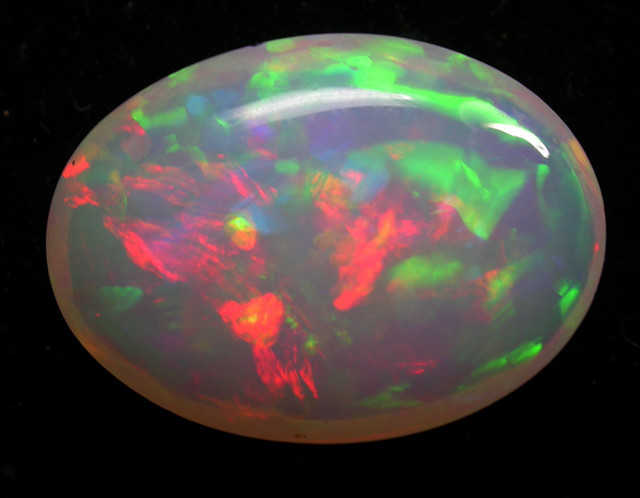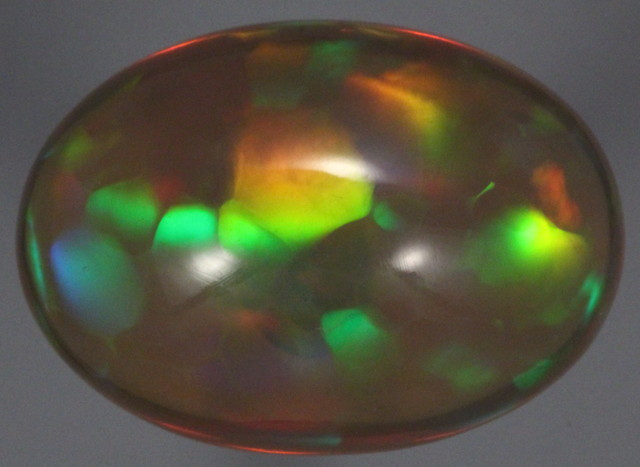
公開日17th Feb 2020
変更日時17th Nov 2025
エチオピアのオパールは倫理的ですか?
 エチオピア産オパールは、地球上で最も貴重で大切にされている宝石の一つです。しかし、最も美しい宝石でさえ魅力を失わせてしまうものがあることをご存知ですか?それは、非倫理的な行為です。さて、いよいよ本題に入ります。エチオピア産オパールは倫理的に問題ないのでしょうか?
エチオピア産オパールは、地球上で最も貴重で大切にされている宝石の一つです。しかし、最も美しい宝石でさえ魅力を失わせてしまうものがあることをご存知ですか?それは、非倫理的な行為です。さて、いよいよ本題に入ります。エチオピア産オパールは倫理的に問題ないのでしょうか?
それは状況によります。エチオピア産オパールは、特定のガイドラインに従えば倫理的に問題ないと言えますが、なぜこのような規制が設けられているのかを理解するために、もう少し話題を広げてみましょう。倫理とは何か、そして宝石業界においてなぜ重要なのでしょうか?倫理的なエチオピア産オパールについて知っておくべきことをすべて詳しく検証していきますので、ぜひ読み進めてください。
倫理的であるとはどういう意味ですか?
目の前の問題に取り組む前に、まず倫理的とはどういう意味なのか、特にオパール採掘において何を意味するのかを理解する必要があります。まず、ある物事を倫理的と定義し、それをオパール採掘における倫理の基準に当てはめるにはどうすればよいでしょうか。倫理的であるということは、善と悪の尺度において道徳的に正しいとみなされるということです。
オパール採掘に関しては、道徳を2つの部分に分けます。
オパールはエチオピアの環境に悪影響を与えない方法で調達されていますか?
そもそも、エチオピアのオパールを採掘する条件は安全ですか?
これら2つの質問に答えることで、エチオピア産オパールが倫理的かどうかを判断するのに役立ちます。まずは、オパール採掘が環境に与える影響から見ていきましょう。 
オパール採掘を倫理的に行うには、調達に関する規則と規制を遵守する必要があります。これらは、採掘プロセスにおいて労働者と土地の両方が保護されるようにするために制定されています。
倫理的なオパール調達の規則と規制
エチオピアは、世界でオパールを産出する7カ国のうちの1つです。実際、エチオピアのオパール産業は約2,500万米ドルの収益を生み出しています。これは、エチオピアの経済を牽引する大きな金額であることはご想像の通りです。そのため、エチオピア政府はオパール採掘労働者に対し、オパールを可能な限り安全に採掘するために必要なあらゆるツールを提供しています。エチオピアの採掘労働者の身体的健康、幸福、そして全体的な安全は、政府関係者にとって最優先事項です。
しかし、それでもなお、鉱業業界全体としては、環境と鉱夫の双方にとって倫理を守るという点では、まだ多くの課題が残されています。2018年現在、国際金属鉱業評議会(ICMM)は、鉱業に従事する鉱夫候補者が満たすべき要件を定めています。 
ICMMは国際評議会として、鉱業倫理の向上と維持に取り組んでいます。鉱業の持続可能性の向上に重点を置くことで、環境保全に貢献するとともに、会員が国際的にオパールを調達することを可能にします。
エチオピア産オパール採掘に必要な書類
2010年現在、エチオピアでオパールを採掘するには、採掘業者は4つのライセンスのうち少なくとも1つを取得することが義務付けられています。この法律は、採掘業者が合法的に操業し、エチオピアの鉱山に入る前に必要な装備を労働者に提供することを保証するために制定されました。エチオピア政府によるこの措置は、採掘行為の倫理性を向上させ、維持することを意図していました。
エチオピアのオパール採掘に有効な4 つの異なるライセンスは次のとおりです。
保持ライセンス
探査ライセンス
偵察許可証
採掘オペレーションチームが使用するスケールド採掘ライセンス
これらの規制は一見良いことのように思えますが、マイナス面もあります。政府の強い介入によりオパールの輸出は極めて困難になり、結果として密輸が急増しています。
エチオピア産オパールから最も恩恵を受けるのは誰でしょうか?
エチオピア産オパールは、高品質でありながらオーストラリア産オパールよりも大幅に安価であることから、大変人気があります。ウェロオパールとも呼ばれるエチオピア産オパールは、他のオパール産地と同等の輝き、遊色効果、そして色調を持ちながら、より手頃な価格帯となっています。
価格が比較的手頃なため、1990年代半ば以降、人気商品となりました。しかし、需要が急増するたびに、それに伴う影響も生じます。需要が高まると、しばしば境界線が曖昧になり、倫理観が曖昧になります。エチオピア産オパールは、その産地と価格の高さから、高い需要が見込まれます。 
すると、疑問が湧いてきます。そもそもなぜエチオピア産オパールはこんなに安いのでしょうか?価格差はエチオピアの採掘者に悪影響を与えているのでしょうか?オパール販売者の利益を増やし、顧客が価格に満足できるように、労働者の賃金を低く抑えているのでしょうか?特に外国から商品を購入する際は、疑問を持つのは自然なことです。疑問を持つことの素晴らしい点は、それが認識の循環につながり、最終的には前向きな変化につながることです。それでも、購入者としては、商品の詳細を知らなければ購入をためらうかもしれません。それも当然です!エチオピア産オパールを購入する際に知っておくべきことをご紹介します。
エチオピア産オパールが倫理的かどうかを見分ける方法
総じて言えば、エチオピア産オパールは、採掘会社が政府の定める要件を満たしていれば倫理的と言えます。たとえ採掘会社が倫理的であると主張していたとしても、地元の採掘者、労働者、そして環境に影響を与える行為について、どのように確信を持てるでしょうか?購入者としてできる最善のことは、お金で投票することです。エチオピアにおける倫理的な採掘を支援するには、オパール採掘プロセスに関する詳細な情報を提供できる販売者から倫理的なオパールを購入しましょう。倫理に関しては、調査が最も重要です。 
非常に優れた宝石なのに、価格があまりにも低い場合は、その背後にある倫理性に疑問を抱くかもしれません。逆に、従業員を大切にする鉱山会社を支援することは、倫理を重視しているというメッセージになります。結局のところ、何にお金を使うかは、宝石市場に大きな影響を与えるのです。
宝石を購入する会社の事実を確認し、オパールを採掘する鉱山を調べましょう。次のような質問を自問自答してみましょう。
鉱山労働者や労働者は公正な賃金を受け取っていますか?
労働条件はどうですか?
地元の野生生物や生息地はどのような影響を受けていますか?
現地での採掘に関する規制は何ですか?
「エチオピア産オパールは倫理的か?」という問いに答えるのは簡単ではありません。しかし、道徳や信念はしばしば難しい問いに根ざしており、時にはさらに難しい答えが生まれることもあります。理想的な世界では、すべての採掘活動は間違いなく、そして心から倫理的であるはずです。
事実、地元の環境、地域社会、そして採掘者に害を与えることなくオパールを調達することは完全に可能です。そして、そのための最良の方法は、信頼できる評判の良い販売者から倫理的なエチオピア産オパールを購入することです。
エチオピア産オパールを購入する
Opal Encyclopedia検索
最新記事
ブラックオパールは、オパールの中でも最も人気のある種類です。深いベースが表面に虹色の輝きを放ちます。ブラックオパールの用途、特性、歴史、そして価値についてご紹介します。
7th Dec 2025
オパールの等級付け方法と価格に影響を与える要因をご紹介します。色や輝き、カットや産地など、それぞれのオパールの価値がどのように評価されるのか、価格帯の例とともにご紹介します。
19th Jul 2023
記事のカテゴリ
All there is to know about Opals including Black Opals, Ethiopian Opals & Boulder Opal
14記事数
Check out our fascinating information and articles on all things amazing in the Opal world
41記事数

